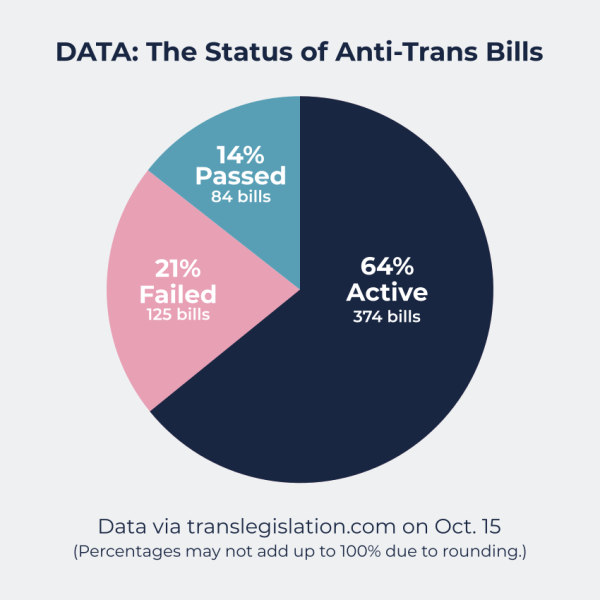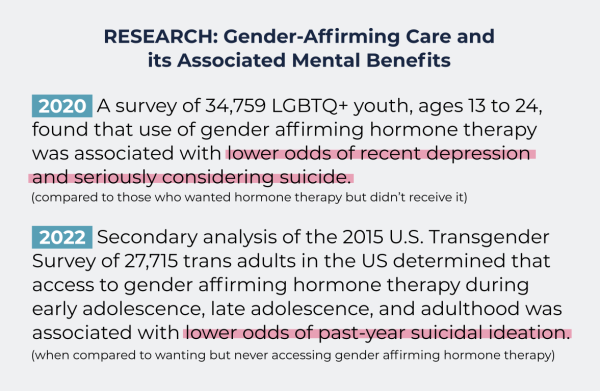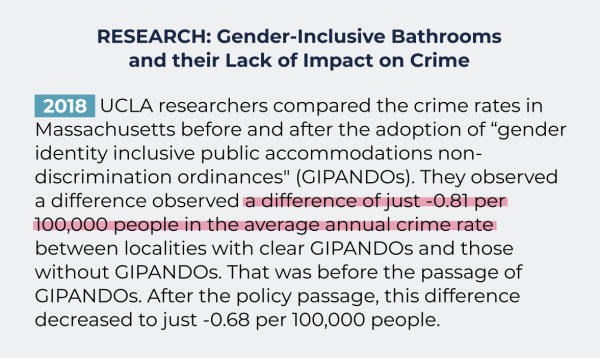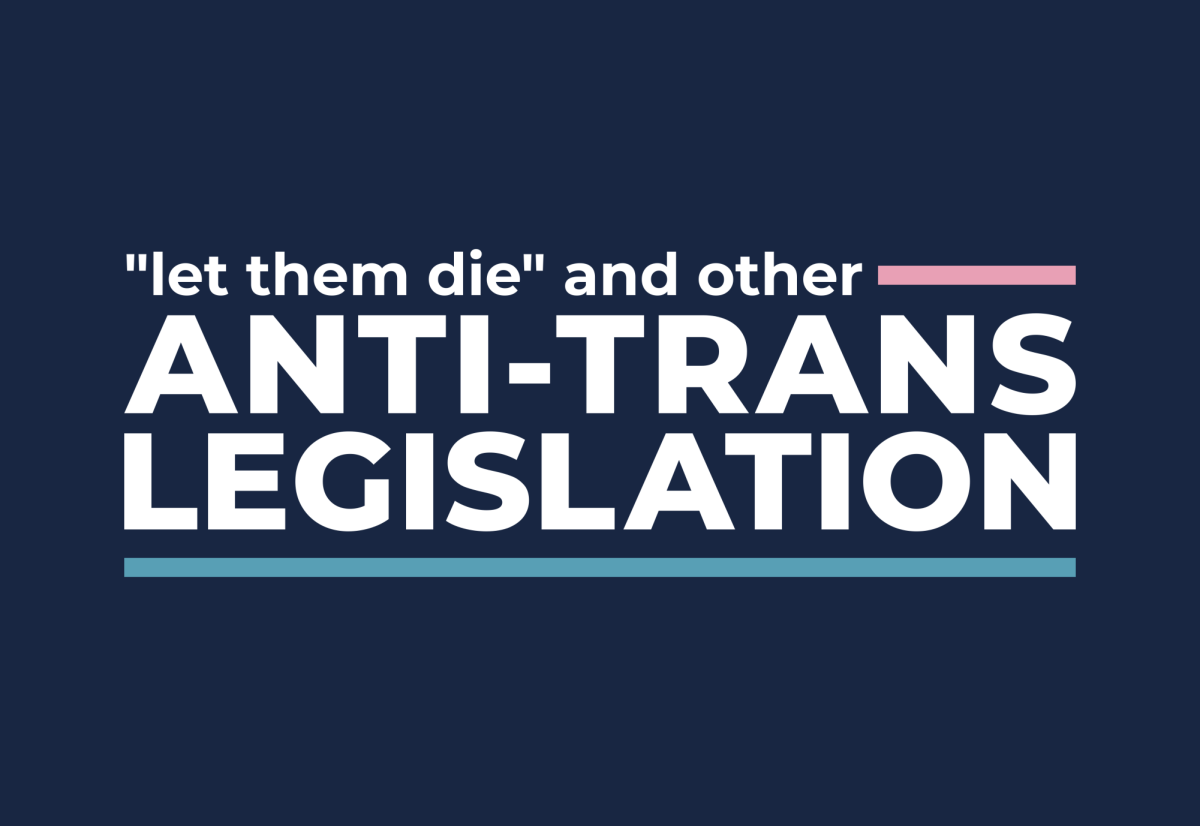At The Blaze, we aim to cover issues of identity with a great deal of sensitivity and respect for our student body. As such, the pronouns and identities of the students in this piece have been published with the permission of the students themselves and their parents.
Imagine a world in which healthcare can legally be denied to you based on nothing but political beliefs. For many transgender individuals, such a world is all too real. A nationwide trend of more and more anti-trans legislation threatens the rights and lives of more than 1.6 million trans people across the United States, and it’s worth talking about.
At the time of writing, 583 pieces of anti-trans legislation have been proposed across the United States. That’s up from September – just last month when that number was 568.
One of these is Florida’s Protections of Medical Conscience Act, signed by Governor Ron DeSantis in May. The act “provid[es] that healthcare providers and healthcare payers have the right to opt out of participation in or payment for certain healthcare services on the basis of conscience-based objections.” In short, the bill allows healthcare providers to legally deny service to patients based on their own religious, moral, or ethical beliefs. As such, it was dubbed the “Let Them Die” Act by those concerned that it would be used to target transgender individuals in particular. If a trans person comes to a doctor for treatment, all the doctor has to do is say that being trans is against their religion, and they can legally refuse care to someone in need.
That is just one of the bills. There are 582 more, and counting.

First and foremost, what exactly does it mean to be “transgender?” According to Merriam-Webster, a trans person is “a person whose gender identity differs from the sex the person had or was identified as having at birth.” Essentially, a trans person is someone who feels that they don’t fit into the box that they were assigned when they were born.
For many, including senior Ari Pashya (they/she), their true gender identity is something they have always known but never fully realized. “It kind of feels like you’ve lived your whole life with a rock in your shoe, and then you figure out–I gotta take the rock out; I gotta switch shoes,” Pashya said. “It’s like you’ve been driving a normal car but putting diesel fuel into it, and then you realize you gotta put the regular one into it.”

This disconnect between assigned sex and true gender identity leads many trans people to undergo a transition process. Changing names, changing pronouns, changing gender on official records, getting surgery, dressing differently, and coming out to friends and family–all these things can be part of someone’s transition. In essence, it’s all about making their body and environment the way that makes them feel happy. It’s making life true to oneself. Thus, everyone transitions differently – and some people even choose not to transition at all. “There’s all these people who are trans, and it makes them happy,” sophomore Charlie Wooddell (he/they) said. “It makes them happy, it ma

kes them comfortable, and it makes them feel good about themselves.”
No matter the case, the actions that trans people want to take are becoming increasingly difficult in a world that seems to constantly challenge their existence via anti-trans legislation. Anti-trans legislation is exactly what it sounds like: bills that affect the lives of transgender individuals negatively, bills that attack trans people. This could be by forcing them to be called a certain name, blocking access to surgeries and healthcare that they want, or even erasing their existence via education bans.
As mentioned earlier, 583 anti-trans bills have been introduced in 2023. Out of these, 84 have passed, 125 have failed, and 374 are still active. These bills are harming people, trans or not, people who are just trying to live their lives, people who are caring for those around them, people like you and me.

An integral part of many transitions is hormone replacement therapy, or HRT. For transmasculine individuals (people who were assigned female at birth but identify otherwise), HRT can help to lower their voice and encourage facial and body hair growth. For transfeminine individuals (people who were assigned male at birth but identify otherwise), HRT can help to slow facial and body hair growth and develop breasts. As part of their transition, many individuals also choose to undergo surgeries, such as top surgery for breast altering. HRT and surgeries both fall under the umbrella term “gender-affirming healthcare.” The ultimate goal of gender-affirming care is simply helping your body align with your gender identity. However, many lawmakers instead see it as something dangerous and harmful.
178 of the proposed 583 bills are related to health. Under Oklahoma’s
introduced Senate Bill 129 (OK SB129), for example, doctors who provide gender transition procedures to anyone under the age of 26 can be prosecuted as felons and subject to license revocation. The justification for this act, like many, is the protection of children. “We have a sacred duty to protect our children from those who wish to do them harm,” said the man behind OK SB129, Republican senator David Bullard, “Senate Bill 129 is designed to protect our children from those who want to benefit financially at their expense. Child abuse is a felony in our state, and mutilating a young person’s genitalia should be viewed no different.”

At first glance, it’s easy to see where Bullard is coming from. After all, something that affects the bodies of children in a life-altering way is certainly something to be scrutinized. The reality, though, is that gender-affirming care is often life-altering and life-saving. Time and time again, researchers have found gender-affirming care to be associated with lower odds of depression and suicide.
And that right there is what throws Bullard’s argument out the window. How can you say that you are “protect[ing] our children” when the b

ills you push are the ones that prevent children from accessing what will really protect them? Gender-affirming healthcare is often what defines a trans person’s transition. It’s being able to have a body that you enjoy, that feels so truly like you, that can stop someone from feeling so uncomfortable in their skin that they take their own life. “[To the lawmakers who are trying to push these bills, you should] help transgender people; that’s saving lives,” Wooddell said. “All these [lawmakers] who are doing this, they also were like ‘oh no, stop suicide,’ stop all these things. And, they’re trying to take away these transgender healthcare rights, all that stuff, and it’s basically doing the opposite of the other things. They’re contradicting themselves.”

Lawmakers have also proposed a considerable amount of bills related to the bathroom, locker room, or sports-related topics. 102 out of the total 583 fall under this category. They range from Arkansas’ House Bill 1156, which prohibits public school students from multiple occupancy restrooms or changing areas not corresponding to their assigned sex while members of the opposite sex are present–essentially alienating them from their peers–to Florida’s House Bill 1521, which forces students to use restrooms respective to their sex “in order to maintain public safety, decency, decorum, and privacy.”
It is this notion of protecting public safety that lawmakers often point to as justification. Opening bathrooms up to trans people means opening up bathrooms to sexual assault, or so the argument goes. In other words, if you allow trans women into women’s restrooms, then you essentially allow “males” into women’s restrooms, since trans women are those assigned male at birth.
An example from our area: in May 2021, a student assigned male at birth wore a skirt, entered the women’s bathroom, and assaulted a female student at Stone Bridge High School. The assailant was transferred to Broad Run High School and proceeded to abduct and sexually assault another student in October 2021. In the fallout, the 15-year-old assailant was convicted, sentenced to undergo treatment at a residential facility, and ordered to register as a sex offender. A special grand jury also found LCPS administrators guilty of mishandling the assaults, leading to former LCPS Superintendent Scott Ziegler being fired and former Public Information Officer Wayde Byard being placed on leave.

It’s cases like these that allow lawmakers to say that including trans people in bathrooms creates a danger to the public. However, the larger truth is anything but that. In a 2018 study published by the UCLA School of Law Williams Institute, researchers found that “reports of privacy and safety violations in public restrooms, locker rooms, and changing rooms are exceedingly rare,” and that “inclusion of gender identity in nondiscrimination laws does not affect the number or frequency of criminal incidents in restrooms, locker rooms, and changing rooms.” In short, events like the example are exceptions, not expectations.
To really care about public safety, then, is to work to protect trans people, for they are part of the public. Trans individuals are–and have always been–truly at risk in bathrooms and beyond. Trans people are not a threat; they are the ones being threatened.

Additionally, just like gender-affirming healthcare, inclusive bathrooms can also help improve the mental health of trans individuals. A 2021 study found that 58% of transgender and/or nonbinary individuals, aged 13 to 24, had been prevented or discouraged from using a bathroom that corresponded with their gender identity. Among these, 85% reported a depressive mood, 60% seriously considered suicide, 1 in 3 reported a past-year suicide attempt, and 1 in 5 reported multiple suicide attempts.
Letting trans people use the bathrooms they feel comfortable in is ultimately yet another way to help decrease discrimination and decrease suicide rates. “I think [protecting trans people] is just like common sense,” senior Bennett Koch (she/her) said. “I think people get so lost in their universe that they forget how important humans are. Why are we just not trying to protect everybody?”


303 out of the total 583 pieces of anti-trans legislation are also categorized as “other.” There is so much more to talk about when it comes to the debate that has resulted from trans people’s existence.
In the “land of the free,” Arkansas has passed House Bill 1468–aka the Given Name Act–prohibiting school employees from addressing students with their preferred name and pronouns without the written permission of their parents, and Montana has passed House Bill 361 providing “that it is not a discriminatory practice for a student to call a student by the student’s legal name or reference the student by the student’s sex.” It’s hypocritical, to say the least, that in a country that so prides itself on “free speech,” bills can pass that criminalize those who call people what they want to be called.
Bills regarding education also fall under the category of “other.” Indiana’s House Bill 1608 has prohibited schools from instructing pre-K to 3rd-grade students on human sexuality, for example.
I could go on and on about the dangers and discrimination that trans people face in school, at work, and everywhere in between. But, I’ve gone on for long enough. At this point, there’s one question I want to answer: why care?

This piece is months in the making. Part of that was me just avoiding my responsibilities, as one does, but some of it was also me avoiding the hard conversations. For this piece, I interviewed three trans people in our school. Having to talk about legislation that harms them and people like them across the U.S. is hard. It is so hard. Listening back to the interviews I recorded back in April, my attention is drawn to one specific question: “There are 361 pieces of anti-trans legislation right now. Does that number surprise you?”
“No,” Wooddell said.
“I mean, if I hadn’t known before, then yes,” Pashya said. “But, it’s just like, I’m so done with this country; I’m not surprised at all.”
“I don’t know about ‘surprised’,” Koch said. “I think it is upsetting, you know. It makes sense with this country.”
In April, there were 361 bills. Now, half a year later, there are over half a thousand. And, thinking about that is tough.

But, “I’m not trans, so this doesn’t affect me,” you might say. That shouldn’t stop you from caring, though. After all, White individuals joined the Black Lives Matter movement, and men fought for women’s suffrage.
There are over 1.6 million transgender individuals across the US–1.6 million people. That’s roughly the population of the city of Philadelphia, Pa. Imagine if lawmakers passed legislation that had the potential to legally deny life-saving healthcare to everyone in the 6th largest city in America.
“It’s incredibly stressful and is unnecessarily harming the people who 1) are a minority and 2) are already one of the most vulnerable groups in the entire country,” Pashya said. “And 3), we’re on our way to what is essentially a genocide of all trans people in the country.”
This notion of genocide is still somewhat up for debate, but some argue that laws banning gender-affirming care and as a result contributing to declining mental health constitute the UN’s definition of genocide which includes “causing serious bodily or mental harm to members of the group.”
“It’s almost like a refugee crisis, you know,” Koch said. “It’s pretty bad in some places, so I think we just need to be ready to take people in for how long they need it and protect trans people.”
While you may not agree with big statements like these, please at least remember the little impacts that anti-trans legislation can still have. From banning gender-affirming care to regulating bathrooms to forcing certain names, anti-trans legislation hurts everybody.
“To every cis [non-trans] person in our school, your support is greatly needed, and I beg you to educate yourself on this topic if you have not already,” Pashya said. Knowledge is power, after all.

“There’s always ways you can [help],” Woodell said. “There [are] petitions. There’s all these things you can do like that. You can also just respect trans people. Let them be. Let them be people.”
“I think it just comes down to building communities, making sure your trans friends are okay and feel safe in your environment,” Koch said. “And, if they don’t feel safe in their environment, working to help make them feel protected.”
That education, respect, and support are often what can change worlds – for Pashya, Woodell, Koch, and 1.6 million more.


























![The Phoenix varsity volleyball team lines up for the national anthem. “We were more communicative [with each other] during this game, and I feel like we kept our energy up, especially after the first set,” senior Jessica Valdov said.](https://theblazerrhs.com/wp-content/uploads/2024/10/DSC_0202-1200x800.jpg)










![Junior Alex Alkhal pitches the ball. “[I] just let it go and keep practicing so we can focus on our goal for the next game to get better as a team,” Alkhal said.](https://theblazerrhs.com/wp-content/uploads/2025/05/DSC_0013-1-1200x929.jpg)





















